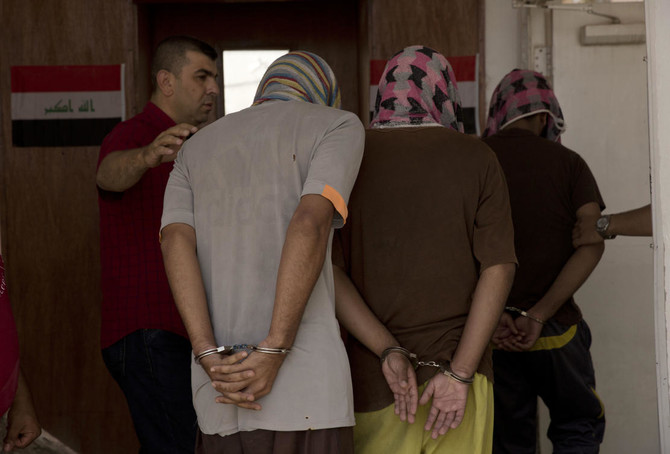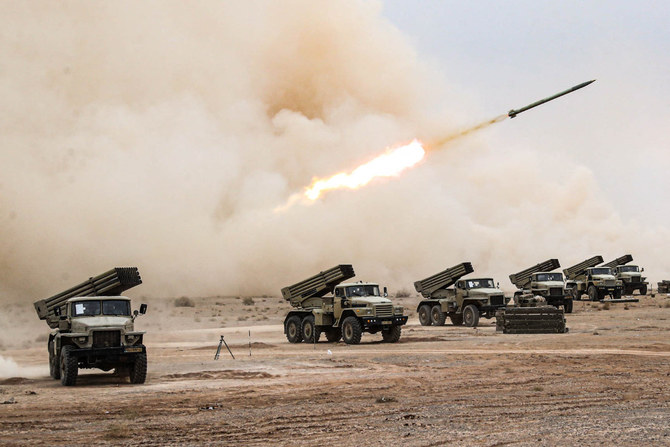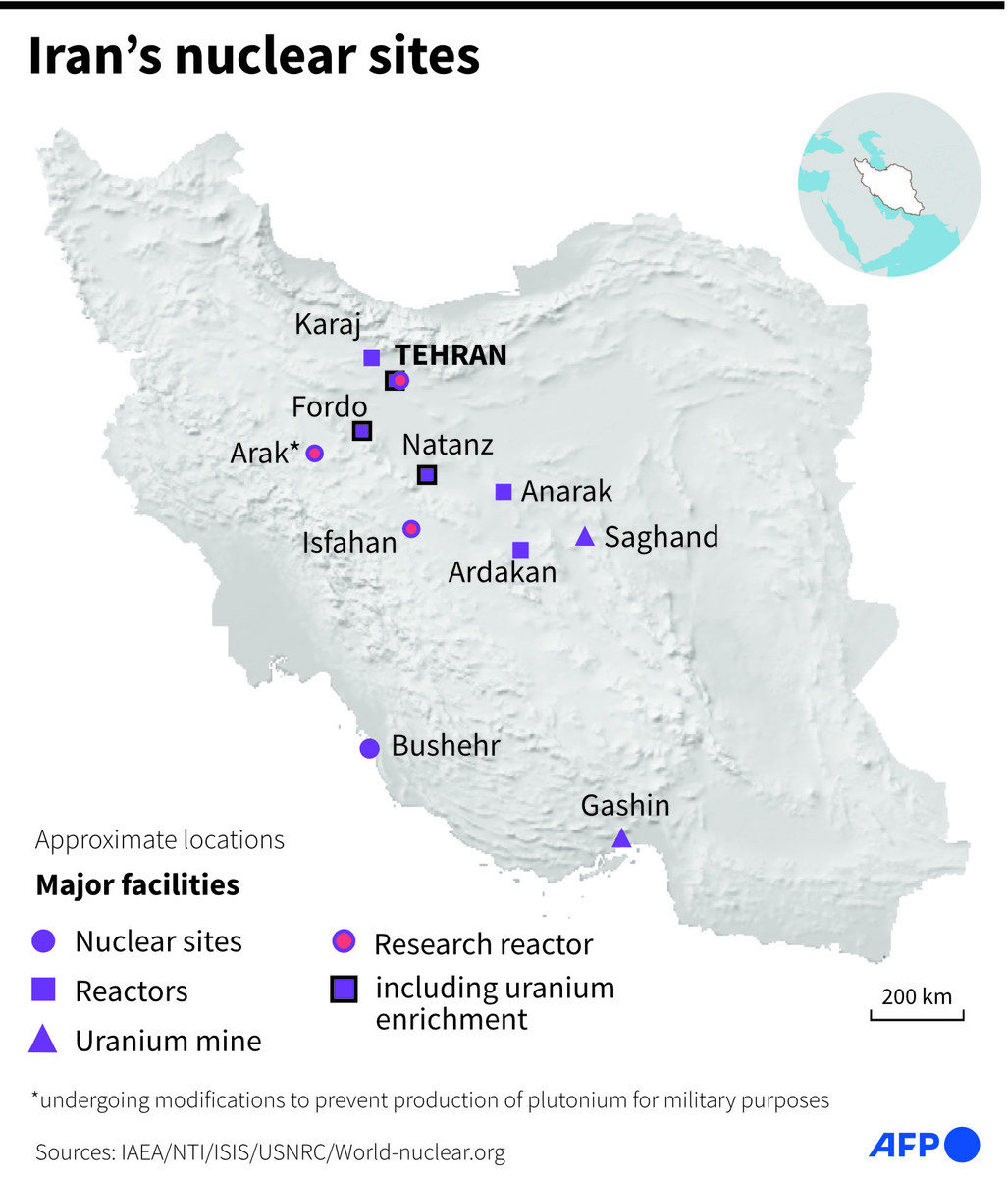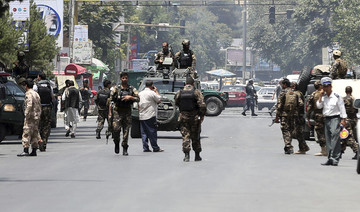BAGHDAD: An Iraqi security agency has admitted holding hundreds of “terrorism” suspects for months, Human Rights Watch said Sunday while calling on authorities to inform the families of those held.
The National Security Service acknowledged it was holding male prisoners at a facility in east Mosul, the Iraqi city from which Daesh was ousted last year.
After previously denying the existence of any detention facilities, the NSS allowed HRW on July 4 to visit the center where the group found clean but “extremely overcrowded” cells.
“Researchers were granted access to the facility, where officials said 427 prisoners were being held at the time,” HRW said in a press release.
Before visiting the facility HRW interviewed archaeologist Faisal Jeber, who said he was detained in early April and estimated at least 450 prisoners were being held, based on a daily head count.
While the 47-year-old was released within 48 hours, he “described horrendous conditions and said that detainees had no access to lawyers, family visits, or medical care.”
Those sharing a cell with Jeber said they had been held for four months to two years, according to the May 16 interview.
An NSS officer speaking on the condition of anonymity told researchers some people had been held for “over one year,” before the end of the battle to retake Mosul from Daesh militants.
On a daily basis, Iraq’s two anti-terror courts in Baghdad and Mosul judge dozens of people suspected of being Daesh members.
Around 20,000 people were arrested during the three-year battle to evict Daesh, which seized swathes of western and northern Iraq in 2014.
Children were among those held at the Mosul facility, HRW said as it called on Iraqi authorities to release all minors who had not been charged with a crime.
“Authorities should be doing whatever it takes to make sure that families know where their loved ones are,” said Lama Fakih, the organization’s deputy Middle East director.
HRW requested the NSS clarify how many people were being held and to detail the number and location of detention facilities.
Families gather weekly in Mosul to demand news of their missing fathers, brothers and sons.
Interviewed by AFP, many of those searching for relatives feared their family members were wrongly detained on “terrorism” charges amid the chaos of the offensive against Daesh.
Jeber, the former detainee, told HRW that prisoners said a man “tortured to the point that he had been half paralyzed” had died at the facility where he was held.
The NSS, which reports to the prime minister, denied the use of torture and acknowledged “very limited cases of death, which were judicially documented.”
Iraq admits holding ‘terrorism’ suspects for months: HRW
Iraq admits holding ‘terrorism’ suspects for months: HRW

- The National Security Service acknowledged it was holding male prisoners at a facility in east Mosul
- Around 20,000 people were arrested during the three-year battle to evict Daesh, which seized swathes of western and northern Iraq in 2014
Dubai carrier Emirates suspends check-in for onward connections, flydubai cancels Iran flights

- Emirates suspends check-in for all customers in its network travelling with onward connections through Dubai
DUBAI: Dubai’s flagship airline Emirates is suspending check-in for all customers with onward connections through the city until 2359 GMT on Friday, three days after a record storm swept the United Arab Emirates.
Emirates, one of the world’s biggest international airlines, said customers traveling to Dubai as their final destination may check-in and travel as usual.
The suspension shows the airline and its hub, Dubai International Airport, are still struggling to clear a backlog of flights after the UAE saw its heaviest rains in the 75 years records have been kept, bringing much of the country to a standstill for two days and causing significant damage.
Thousands of passengers have been affected by flight cancelations this week, Dubai Airports Chief Executive Paul Griffiths told local radio station Dubai Eye on Friday, after the storm flooded taxiways.
Dubai Airports Chief Operating Officer Majed Al-Joker said on Thursday that Dubai International Airport would resume normal operations within 24 hours and signalled a return to full capacity and regular schedule, state news agency WAM reported.
The storm, which hit neighboring Oman on Sunday, pounded the UAE on Tuesday, with 20 reported dead in Oman and one in the UAE.
Dubai’s budget carrier flydubai meanwhile canceled flights to Iran on Friday after receiving an official alert, a statement said.
“In line with the issued NOTAM (notice to air missions), our flights to Iran today have been canceled,” said the statement.
One flight which had already departed for Tehran returned to Dubai after the Iranian capital’s airport was closed, it added.
Flights were suspended across swathes of Iran as Iranian state media reported explosions in the central province of Isfahan.
Flight-tracking software showed commercial flights avoiding western Iran, including Isfahan, and skirting Tehran to the north and east.
The main road that connects the UAE’s most populous emirate Dubai with Abu Dhabi remains partially closed, while an alternative route into Dubai requires vehicles to use a road that is entirely covered in floodwater where cars and buses have been abandoned.
In the UAE’s north, including in the emirate of Sharjah, people were reportedly still trapped in their homes, while others there said there had been extensive damage to businesses.
Rains are rare in the UAE and elsewhere on the Arabian Peninsula, which is typically known for its dry desert climate where summer air temperatures can soar above 50 degrees Celsius.
The UAE’s National Center of Meteorology said on social platform X that Monday may see light rainfall by late night and forecast “a chance of light to moderate rainfall, might be heavy at times over some areas” for Tuesday, with a fall in temperatures over some coastal areas.
Iran closes air space, commercial flights diverted after apparent Israeli retaliatory strikes

- Drones shot down over Isfahan, says Iranian state media
- Israel military refuses to comment on incident
DUBAI/WASHINGTON: Israeli missiles have hit a site in Iran, ABC News reported late on Thursday, citing a US official, while Iranian state media reported an explosion in the center of the country, days after Iran launched a retaliatory drone strike on Israel.
Commercial flights began diverting their routes early Friday morning over western Iran without explanation as one semiofficial news agency in the Islamic Republic claimed there had been “explosions” heard over the city of Isfahan.
Some Emirates and Flydubai flights that were flying over Iran early on Friday made sudden sharp turns away from the airspace, according to flight paths shown on tracking website Flightradar24.
“Flights over Isfahan, Shiraz and Tehran cities have been suspended,” state media reported.
Iranian officials said its air defenses did shot down several drones but there had been “no missile attack for now” on the country.
The state-run IRNA news agency reported that Iran fired air defense batteries early Friday morning across several provinces after reports of explosions near the city of Isfahan.
Several drones “have been successfully shot down by the country’s air defense, there are no reports of a missile attack for now,” Iran’s space agency spokesman Hossein Dalirian says on X.
The Fars news agency said “three explosions” were heard near the Shekari army airbase near Isfahan.
Iran’s local media also reported that nuclear facilities in Isfahan were “completely secure” after explosions were heard near the area.
“Nuclear facilities in Isfahan province are completely secure,” Tasnim news agency reports, quoting “reliable sources.”
Israel had said it would retaliate against Iran’s weekend attack, which involved hundreds of drones and missiles in retaliation for a suspected Israeli strike on its embassy compound in Syria. Most of the Iranian drones and missiles were downed before reaching Israeli territory.
Several Iranian nuclear sites are located in Isfahan province, including Natanz, centerpiece of Iran’s uranium enrichment program. Isfahan, Isome 350 kilometers (215 miles) south of Iran’s capital, Tehran, is also home to a major air base for the Iranian military.
Meanwhile in Iraq where a number of Iranian-backed militias are based, residents in Baghdad reported hearing sounds of explosions, but the source of the noise was not immediately clear.
In Syria, a local activist group said strikes hit an army position in the south of the country Friday.
“There were strikes on a Syrian army radar position,” said Rayan Maarouf, who runs the Suwayda24 anti-government website that covers news from Sweida province in the south.
Iranian military positions in Syria had been frequently targetted by Israeli air strikes over the past years. Early this month, an Israeli strike demolished a consular building annex of the Iranian Embassy in Sydia's capital Damascus, killing 13 people, including two generals of Iran's Revolutionary Guards, triggering the Iranian missiles and drones attack on Israel on April 13.
At the United Nations Security Council on Thursday, Iran urged member nations that Israel “must be compelled to stop any further military adventurism against our interests” as the UN secretary-general warned that the Middle East was in a “moment of maximum peril.”
Israel had said it was going to retaliate against Iran’s April 13 missile and drone attack.
Analysts and observers have been raising concerns about the risks of the Israel-Gaza war spreading into the rest of the region.
Oil prices and jumped on the reports of the Israeli strike. Brent crude futures rose 2 percent to $88.86 a barrel, the dollar gained broadly, gold rose 1 percent and S&P 500 futures dropped 1 percent.
Israel’s assault on Gaza began after Palestinian Islamist group Hamas attacked Israel on Oct. 7, killing 1,200, according to Israeli tallies.
Israel’s military offensive has killed over 33,000 Palestinians in Gaza, according to the local health ministry.
Iran-backed groups have declared support for Palestinians, launching attacks from Lebanon, Yemen and Iraq.
United States had advance warning of Israel attack on Iran: US media

- US media: Israel had provided Washington with pre-notification of the strike
- Tehran’s two major airports resumed flights following a brief suspension
DUBAI/WASHINGTON/TEHRAN: The United States received advance notice of Israel’s reported strike on Iran but did not endorse the operation or play any part in its execution, US media quoted officials as saying.
NBC and CNN, citing sources familiar with the matter and a US official, respectively, said Israel had provided Washington with pre-notification of the strike.
Various networks cited officials confirming a strike had taken place inside Iran, with CNN quoting one official as stating the target was not a nuclear facility.
Israel told the United States on Thursday it would be retaliating against Iran in the coming days, a senior US official told CNN.
“We didn’t endorse the response,” the official said, according to CNN.
There was no immediate comment from the White House about the Israeli strike.
In response to a query from AFP, the Pentagon duty desk said: “We do not have anything to offer at this time.”
Iran activated its air defense system over several cities, state media reported, after the country’s official broadcaster said explosions were heard near the central city of Isfahan.
Israel warned it would hit back after Iran fired hundreds of missiles and drones at its arch-foe over the weekend. Most of them were intercepted.
That weekend barrage came in the wake of an attack on Iran’s consulate in Damascus widely blamed on Israel.
Tehran’s two major airports resumed flights on Friday, state media reported, following a brief suspension after explosions were heard in central Iran.
“Flights through Imam Khomeini and Mehrabad airports have resumed,” the official IRNA news agency reported.
Commercial flights began diverting their routes early Friday morning over western Iran without explanation as one semiofficial news agency in the Islamic Republic claimed there had been “explosions” heard over the city of Isfahan.
Some Emirates and Flydubai flights that were flying over Iran early on Friday made sudden sharp turns away from the airspace, according to flight paths shown on tracking website Flightradar24.
“Flights over Isfahan, Shiraz and Tehran cities have been suspended,” state media reported.
Iranian officials said its air defenses did shot down several drones but there had been “no missile attack for now” on the country.
The state-run IRNA news agency reported that Iran fired air defense batteries early Friday morning across several provinces after reports of explosions near the city of Isfahan.
Several drones “have been successfully shot down by the country’s air defense, there are no reports of a missile attack for now,” Iran’s space agency spokesman Hossein Dalirian says on X.
The Fars news agency said “three explosions” were heard near the Shekari army airbase near Isfahan.
Iran’s local media also reported that nuclear facilities in Isfahan were “completely secure” after explosions were heard near the area.
“Nuclear facilities in Isfahan province are completely secure,” Tasnim news agency reports, quoting “reliable sources.”
Israel had said it would retaliate against Iran’s weekend attack, which involved hundreds of drones and missiles in retaliation for a suspected Israeli strike on its embassy compound in Syria. Most of the Iranian drones and missiles were downed before reaching Israeli territory.
Several Iranian nuclear sites are located in Isfahan province, including Natanz, centerpiece of Iran’s uranium enrichment program. Isfahan, Isome 350 kilometers (215 miles) south of Iran’s capital, Tehran, is also home to a major air base for the Iranian military.

Meanwhile in Iraq where a number of Iranian-backed militias are based, residents in Baghdad reported hearing sounds of explosions, but the source of the noise was not immediately clear.
In Syria, a local activist group said strikes hit an army position in the south of the country Friday.
“There were strikes on a Syrian army radar position,” said Rayan Maarouf, who runs the Suwayda24 anti-government website that covers news from Sweida province in the south.
Iranian military positions in Syria had been frequently targetted by Israeli air strikes over the past years. Early this month, an Israeli strike demolished a consular building annex of the Iranian Embassy in Sydia's capital Damascus, killing 13 people, including two generals of Iran's Revolutionary Guards, triggering the Iranian missiles and drones attack on Israel on April 13.
At the United Nations Security Council on Thursday, Iran urged member nations that Israel “must be compelled to stop any further military adventurism against our interests” as the UN secretary-general warned that the Middle East was in a “moment of maximum peril.”
Israel had said it was going to retaliate against Iran’s April 13 missile and drone attack.
Analysts and observers have been raising concerns about the risks of the Israel-Gaza war spreading into the rest of the region.
Oil prices and jumped on the reports of the Israeli strike. Brent crude futures rose 2 percent to $88.86 a barrel, the dollar gained broadly, gold rose 1 percent and S&P 500 futures dropped 1 percent.
Israel’s assault on Gaza began after Palestinian Islamist group Hamas attacked Israel on Oct. 7, killing 1,200, according to Israeli tallies.
Israel’s military offensive has killed over 33,000 Palestinians in Gaza, according to the local health ministry.
Iran-backed groups have declared support for Palestinians, launching attacks from Lebanon, Yemen and Iraq.
Hamas slams US veto of Palestinian UN membership bid

PALESTINIAN TERRITORIES: Palestinian militant group Hamas condemned on Friday the US veto that ended a long-shot Palestinian bid for full United Nations membership.
“Hamas condemns the American veto at the Security Council of the draft resolution granting Palestine full membership in the United Nations,” the Gaza Strip rulers said in a statement, which comes amid growing international concern over the toll inflicted by the war in the besieged Palestinian territory.
The veto by Israel’s main ally and military backer had been expected ahead of the vote, which took place more than six months into Israel’s offensive in Gaza, in retaliation for the deadly October 7 attack by Hamas militants.
Twelve countries voted in favor of the draft resolution, which was introduced by Algeria and “recommends to the General Assembly that the State of Palestine be admitted to membership of the United Nations.” Britain and Switzerland abstained.
Gazans search for remains after deadly Rafah strike

- ‘We retrieved the remains of children and women, finding arms and feet. They were all torn to pieces’
An Israeli strike hit the home where a displaced Palestinian family was sheltering in the southern city of Rafah, relatives and neighbors said as they scraped at the soil with their hands.
Al-Arja said the blast killed at least 10 people.
“We retrieved the remains of children and women, finding arms and feet. They were all torn to pieces.
“This is horrifying. It’s not normal,” he said, hauling concrete and broken olive branches from the wreckage. “The entire world is complicit.”
Soon after the war began on Oct. 7, Israel told Palestinians living in the north of Gaza to move to “safe zones” in the territory’s south, like Rafah.
But Israeli Prime Minister Benjamin Netanyahu has since vowed to invade the city, where around 1.5 million people live in shelters, more than half the territory’s population.
“How is Rafah a safe place?” said Zeyad Ayyad, a relative of the victims. He sighed as he cradled a fragment of the remains.
“I heard the bombing last night and then went back to sleep. I did not think it hit my aunt’s house.”
The search for remains was long and painful. The strike left a huge crater and children picked through the rubble while neighbors removed debris, tarpaulin, a pink top.
“We can see them under the rubble and we’re unable to retrieve them,” Al-Arja said.
“These are people who came from the north because it was said the south is safe.”
“They struck without any warning,” he said.
In a separate strike on the house in Rafah’s Al-Salam neighborhood overnight on Tuesday, rescue crews recovered the corpses of eight family members, including five children and two women, Gaza’s civil defense service said.
“An Israeli rocket hit a house of displaced people,” said resident Sami Nyrab.
“My sister’s son-in-law, her daughter, and her children were having dinner when an Israeli missile demolished their house over their heads.”
















